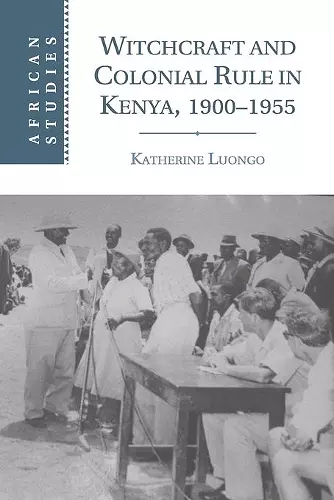Witchcraft and Colonial Rule in Kenya, 1900–1955
Format:Paperback
Publisher:Cambridge University Press
Published:21st May '15
Currently unavailable, and unfortunately no date known when it will be back

This book develops an ethnography of Kamba witchcraft and its contentious relationship with the state in colonial Kenya.
This book chronicles witchcraft practices in colonial Kenya and the attempts of British bureaucrats to control them. Colonial authorities produced an elaborate body of jurisprudence, making witchcraft a capital offense punishable by death. This book offers an analytical narrative of these efforts in the first half of the twentieth century.Focusing on colonial Kenya, this book shows how conflicts between state authorities and Africans over witchcraft-related crimes provided an important space in which the meanings of justice, law and order in the empire were debated. Katherine Luongo discusses the emergence of imperial networks of knowledge about witchcraft. She then demonstrates how colonial concerns about witchcraft produced an elaborate body of jurisprudence about capital crimes. The book analyzes the legal wrangling that produced the Witchcraft Ordinances in the 1910s, the birth of an anthro-administrative complex surrounding witchcraft in the 1920s, the hotly contested Wakamba Witch Trials of the 1930s, the explosive growth of legal opinion on witch-murder in the 1940s, and the unprecedented state-sponsored cleansings of witches and Mau Mau adherents during the 1950s. A work of anthropological history, this book develops an ethnography of Kamba witchcraft or uoi.
'This is one of the finest historical ethnographies of witchcraft and statecraft that I have read. Luongo simultaneously gives account of Kamba witchcraft and of the British colonial juridical system through which it was policed - two cosmologies that not only came into conflict but that also profoundly shaped one another over time. The rich detail of the work - a reading of the archives at once anthropological and historical - makes for captivating reading and, in light of the continuing, sometimes explosive, juxtaposition of witchcraft and formal legal systems in postcolonial East Africa and beyond, a work of significant contemporary relevance.' Harry G. West, SOAS, University of London
'Where witchcraft is very often taken to be a peculiar aspect of Africans' mentality, Luongo's fine book shows how the occult was translated, disciplined, and organized by British and Kenyan brokers. The regulation of witchcraft was one of the tensions of empire, an occupation in which Kenyan practitioners played a role alongside British authorities. Luongo's book allows us to see how witches haunted colonial power, giving us new insights into the uncertainties of governance.' Derek Peterson, University of Michigan, and author of Creative Writing: Translation, Bookkeeping, and the Work of Imagination in Kenya
'Luongo's vivid style of anthropological history brings out the full complexity of colonial officials' positioning toward the witchcraft conundrum. But the interest of this groundbreaking study is much broader. Luongo's imaginative analysis of rich legal data and people's memories shows witchcraft to be an ongoing, basic challenge to state formation as such, up to the present day.' Peter Geschiere, University of Amsterdam, and author of The Modernity of Witchcraft: Politics of the Occult in Postcolonial Africa
'Through its analysis of judicial matters concerning witchcraft, this book makes an important contribution to understandings of the construction of both the colonial and postcolonial state. It illustrates the reliance of an anthropological history on legal research.' Hervé Maupeu, Université de Pau et des Pays de l'Adour
'… forces readers to re-imagine the construct of law and perceptions of order in relation to empire and will undoubtedly become essential reading for Africanist scholars of various specialities.' Reviews in History (history.ac.uk/reviews)
ISBN: 9781107529847
Dimensions: 230mm x 153mm x 15mm
Weight: 400g
264 pages